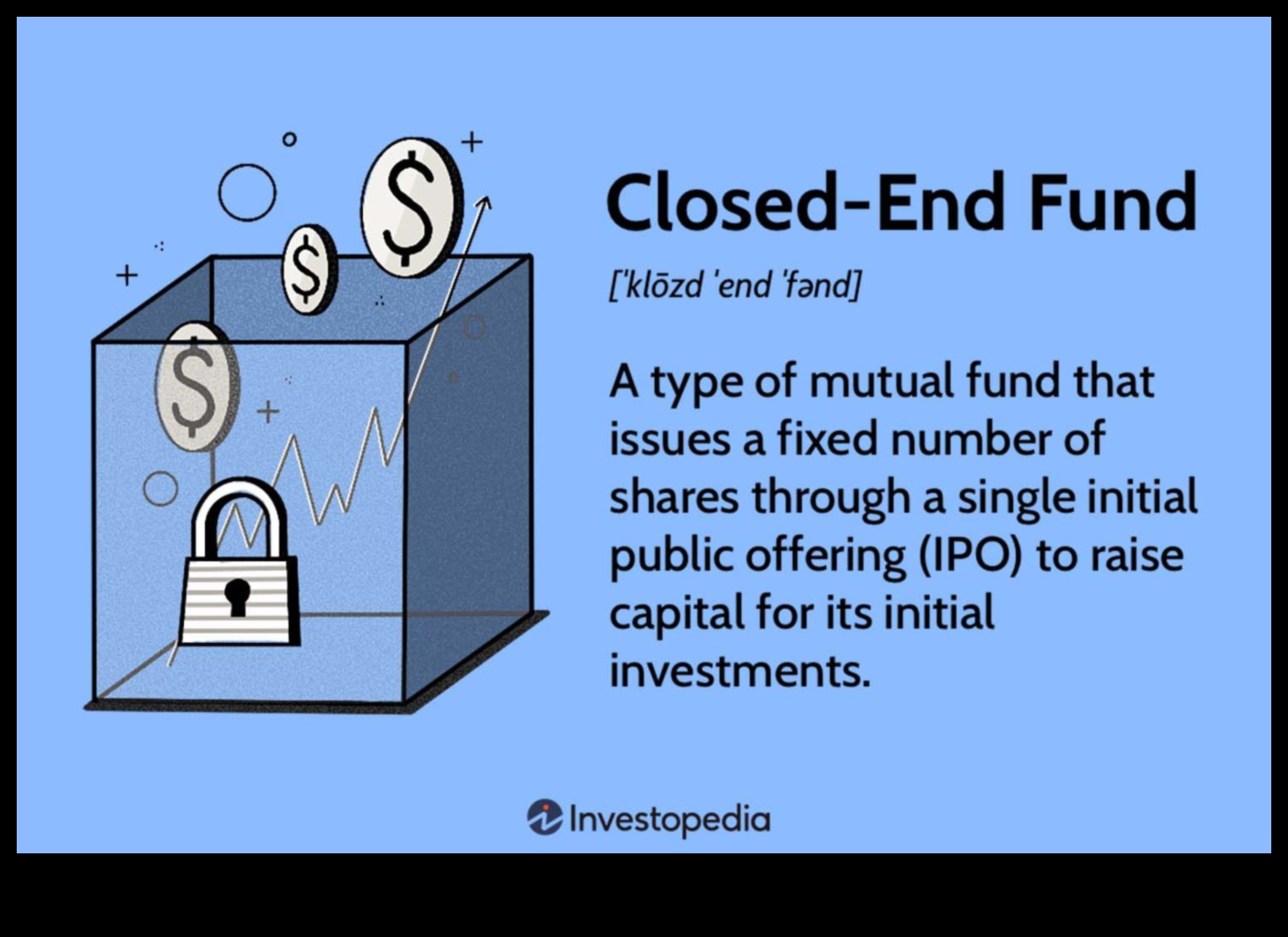
A closed-end fund is a type of investment fund that has a fixed number of shares that are traded on an exchange. Unlike open-end funds, which can issue new shares and redeem existing shares at any time, closed-end funds do not issue new shares once they have been initially offered. This means that the supply of shares in a closed-end fund is fixed, and the price of the shares is determined by the forces of supply and demand.
Closed-end funds can invest in a variety of assets, including stocks, bonds, and real estate. They can also be actively managed or passively managed. Actively managed closed-end funds have a manager who selects the investments for the fund, while passively managed closed-end funds track a specific index or benchmark.
Closed-end funds can offer a number of advantages over other types of investments, including:
- Diversification: Closed-end funds can provide diversification across a variety of asset classes, which can help to reduce risk.
- Professional management: Closed-end funds are typically managed by experienced professionals who have a proven track record of success.
- Liquidity: Closed-end funds can be traded on an exchange, which makes them relatively liquid.
However, closed-end funds also have some disadvantages, including:
- Higher fees: Closed-end funds typically have higher fees than other types of investments, such as mutual funds.
- Bid-ask spread: The price of a closed-end fund can be different from its net asset value (NAV), due to the bid-ask spread.
- Illiquidity: Closed-end funds can be illiquid, especially if they are small or have a narrow market.
Overall, closed-end funds can be a good investment option for investors who are looking for diversification, professional management, and liquidity. However, it is important to be aware of the potential risks and costs associated with investing in closed-end funds before making a decision.
| Topic | Answer |
|---|---|
| Closed-end fund definition | A closed-end fund is a type of investment fund that issues a fixed number of shares that are traded on an exchange. |
| Closed-end fund investing | There are a number of factors to consider when investing in a closed-end fund, including the fund’s investment objective, its performance history, and its fees. |
| Closed-end fund performance | Closed-end funds can have a variety of different performance characteristics, depending on the fund’s investment objective and strategy. |
| Closed-end fund types | There are a number of different types of closed-end funds, including equity funds, bond funds, and real estate funds. |
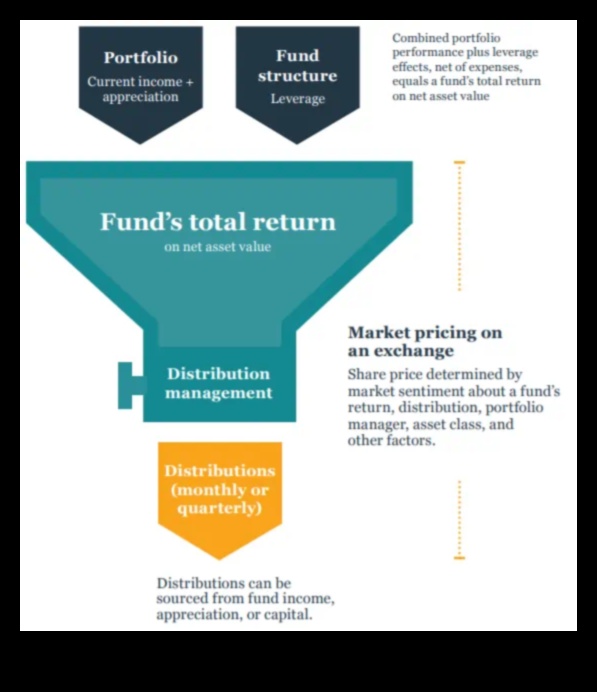
What is a closed-end fund?
A closed-end fund is a type of investment fund that has a fixed number of shares that are issued and then traded on the open market. Unlike open-end funds, which can issue new shares to meet demand, closed-end funds do not issue new shares once the fund has been closed. This means that the supply of shares is fixed, and the price of shares is determined by supply and demand.
Closed-end funds can invest in a variety of assets, including stocks, bonds, and real estate. They can also be structured as either equity funds or debt funds. Equity funds invest in stocks, while debt funds invest in bonds.
Closed-end funds offer a number of advantages over other types of investments, including:
- Liquidity: Closed-end funds can be easily bought and sold on the open market, making them a relatively liquid investment.
- Diversification: Closed-end funds can invest in a variety of assets, which can help to diversify your portfolio and reduce your risk.
- Professional management: Closed-end funds are managed by professional investment managers who have the expertise to select and manage investments.
However, closed-end funds also have some disadvantages, including:
- Higher fees: Closed-end funds typically have higher fees than other types of investments, such as mutual funds.
- Potential for discounts: The price of closed-end fund shares can trade at a discount to their net asset value (NAV). This means that you may not get back as much money as you invested if you sell your shares.
- Illiquidity: Closed-end funds can be illiquid, especially if they are small or invest in illiquid assets. This means that it may be difficult to sell your shares quickly if you need to.
Overall, closed-end funds can be a good investment option for investors who are looking for a diversified, professionally managed investment that offers some liquidity. However, it is important to be aware of the potential risks and costs associated with closed-end funds before investing.
III. What is a closed-end fund?
A closed-end fund is a type of investment fund that has a fixed number of shares that are issued by the fund company. Once the fund is created, new shares are not issued and existing shares can only be bought and sold on the secondary market. This means that the price of a closed-end fund can fluctuate based on supply and demand, and it is not necessarily related to the underlying value of the fund’s assets.
Closed-end funds can invest in a variety of assets, including stocks, bonds, and real estate. They can also be structured as either equity funds or debt funds. Equity funds invest in stocks, while debt funds invest in bonds.
Closed-end funds offer a number of advantages over other types of investment funds, including:
- Diversification: Closed-end funds can invest in a variety of assets, which can help to reduce risk.
- Professional management: Closed-end funds are managed by professional investment managers who have a track record of success.
- Liquidity: Closed-end funds can be bought and sold on the secondary market, which provides liquidity for investors.
However, closed-end funds also have some disadvantages, including:
- Trading costs: There are fees associated with buying and selling closed-end funds.
- Bid-ask spread: The bid-ask spread is the difference between the price that a buyer is willing to pay for a share of a closed-end fund and the price that a seller is willing to accept. This can eat into your returns.
- Management fees: Closed-end funds charge management fees, which can reduce your returns.
Overall, closed-end funds can be a good investment option for investors who are looking for a diversified, professionally managed investment that offers liquidity. However, it is important to be aware of the potential risks and costs associated with investing in closed-end funds.
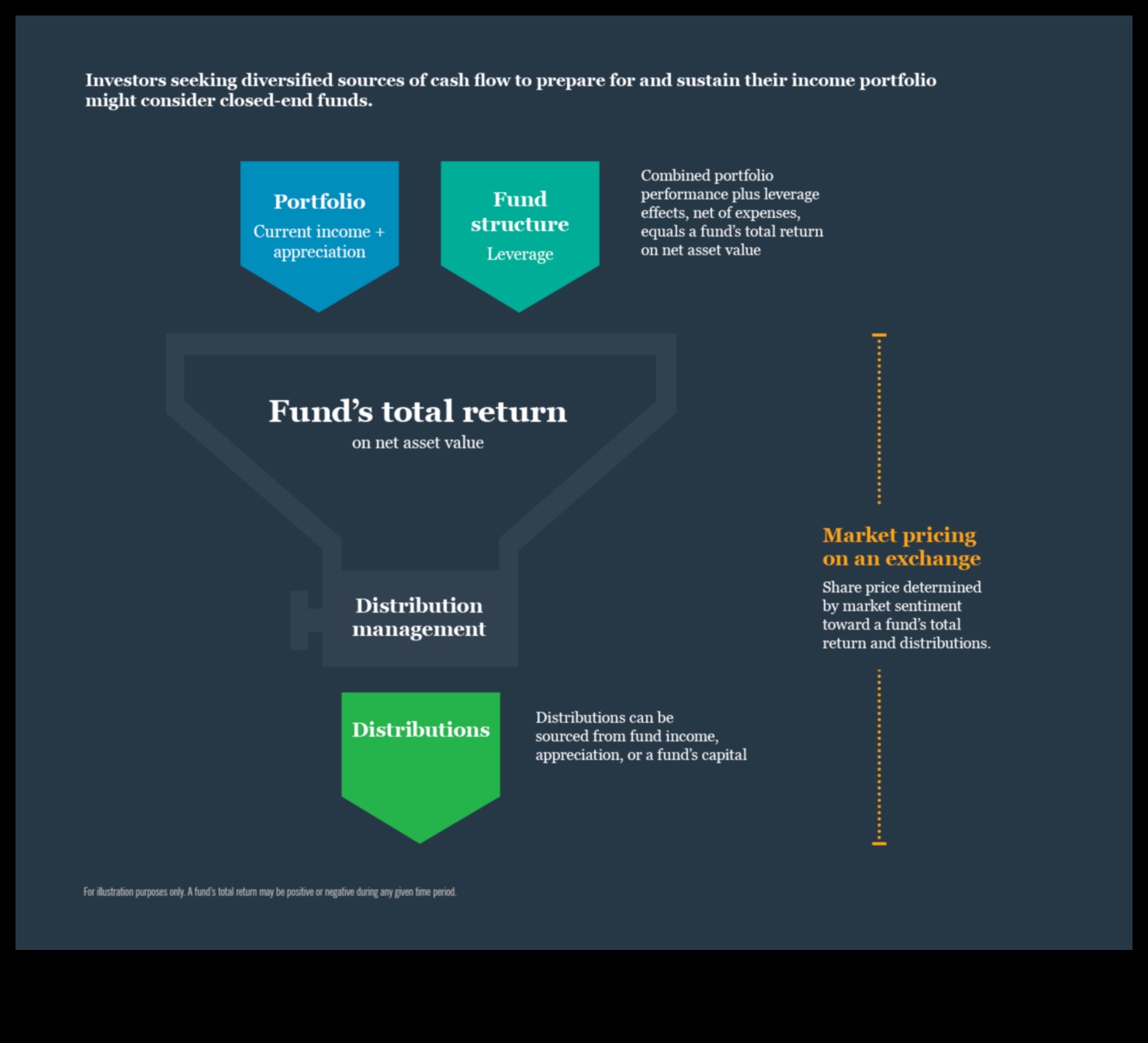
4. How do closed-end funds work?
Closed-end funds work by issuing a fixed number of shares to investors, which are then traded on the open market. The fund’s net asset value (NAV) is calculated daily by taking the total value of its assets and subtracting its liabilities. The fund’s share price can trade at a premium or discount to its NAV, depending on market conditions.
When you invest in a closed-end fund, you are buying shares of a pool of assets that are managed by a professional investment team. The fund’s investment objective will determine what types of assets it invests in, such as stocks, bonds, or real estate. Closed-end funds can also be actively managed or passively managed.
Closed-end funds can offer a number of advantages over other investment options, such as:
- Diversification: Closed-end funds can provide diversification across a variety of asset classes, which can help to reduce risk.
- Professional management: Closed-end funds are managed by professional investment teams that have the experience and expertise to select and manage investments.
- Liquidity: Closed-end funds can be traded on the open market, which provides liquidity for investors who need to sell their shares.
However, closed-end funds also have some disadvantages, such as:
- Trading fees: Closed-end funds can have higher trading fees than other investment options, such as mutual funds.
- Bid-ask spreads: The bid-ask spread is the difference between the price that a buyer is willing to pay for a share of a closed-end fund and the price that a seller is willing to accept. This spread can eat into your returns.
- Discounts and premiums: Closed-end funds can trade at a discount or premium to their NAV, which can make it difficult to determine their true value.
Overall, closed-end funds can be a good investment option for investors who are looking for diversification, professional management, and liquidity. However, it is important to be aware of the potential risks and costs associated with investing in closed-end funds before making a decision.
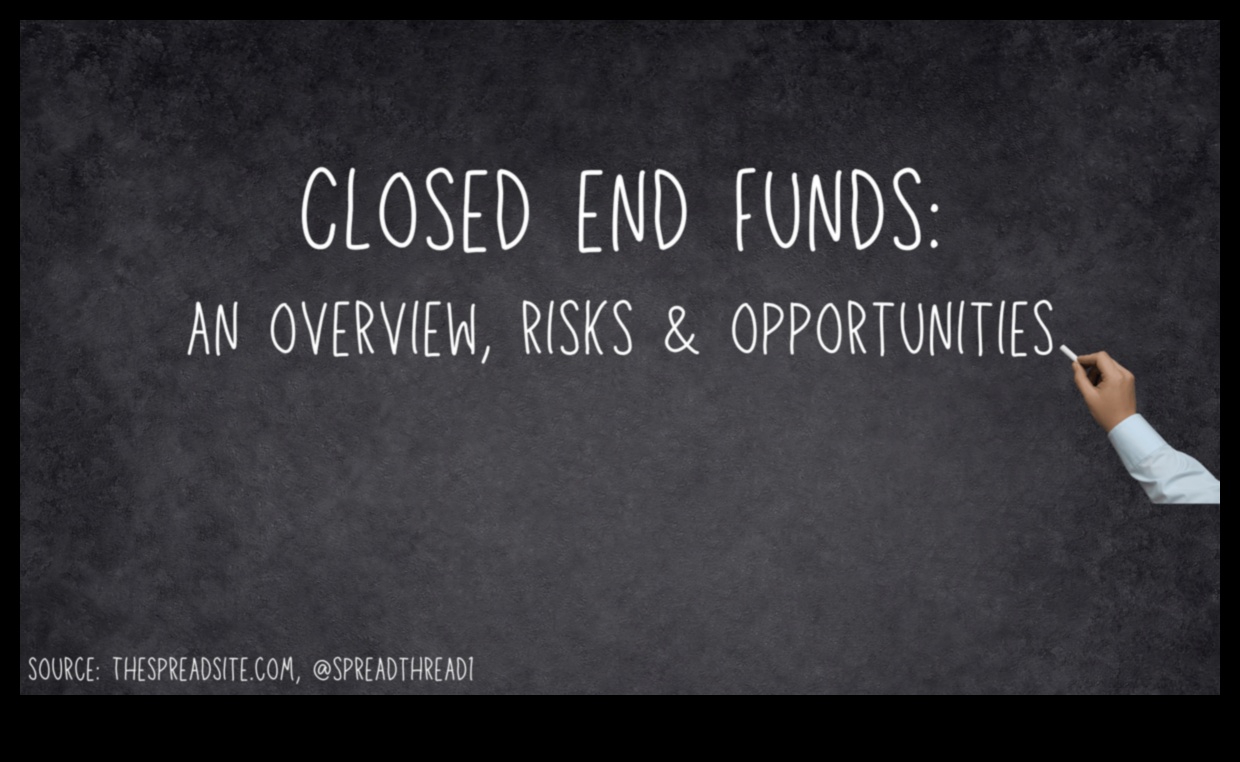
V. Advantages of closed-end funds
There are a number of advantages to investing in closed-end funds, including:
- Diversification: Closed-end funds can provide diversification across a variety of asset classes, industries, and countries. This can help to reduce risk and volatility in your portfolio.
- Professional management: Closed-end funds are managed by professional investment managers who have the expertise and experience to select stocks and other investments that are likely to outperform the market.
- Liquidity: Closed-end funds can be traded on the secondary market, which means that you can sell your shares at any time. This provides liquidity and allows you to access your money quickly if you need it.
- Tax efficiency: Closed-end funds are typically taxed as corporations, which can be more tax-efficient than other types of investments, such as mutual funds.
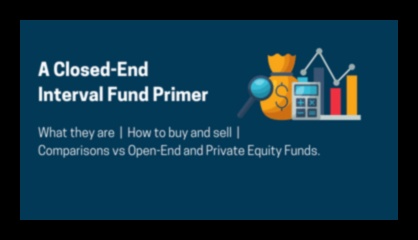
II. What is a closed-end fund?
A closed-end fund is a type of investment fund that issues a fixed number of shares that are traded on an exchange. Unlike open-end funds, which can issue new shares and redeem existing shares at any time, closed-end funds do not allow new shares to be issued or redeemed. This means that the price of a closed-end fund’s shares is determined by supply and demand, and can trade at a premium or discount to its net asset value (NAV).
Closed-end funds can invest in a variety of assets, including stocks, bonds, and real estate. They can also be actively managed or passively managed. Actively managed funds have a manager who selects the investments for the fund, while passively managed funds track an index or benchmark.
Closed-end funds can offer a number of advantages over other types of investments, including:
- Diversification: Closed-end funds can provide diversification across a variety of asset classes, which can help to reduce risk.
- Professional management: Closed-end funds are typically managed by experienced professionals who have a proven track record of success.
- Liquidity: Closed-end funds can be easily bought and sold on an exchange, which makes them a relatively liquid investment.
However, closed-end funds also have some disadvantages, including:
- Trading fees: There are typically fees associated with buying and selling closed-end fund shares.
- Premiums and discounts: The price of a closed-end fund’s shares can trade at a premium or discount to its NAV, which can increase the risk of loss.
- Tax implications: Closed-end funds can be subject to different tax treatment than other types of investments.
Overall, closed-end funds can be a good investment option for investors who are looking for a diversified, professionally managed investment that is relatively liquid. However, it is important to be aware of the potential risks and rewards before investing in a closed-end fund.
VII. How to choose a closed-end fund
There are a few factors to consider when choosing a closed-end fund. These include:
* The fund’s investment objective and strategy. What is the fund trying to achieve, and how does it plan to do so?
* The fund’s historical performance. How has the fund performed over time, and how does it compare to other funds in its category?
* The fund’s fees and expenses. How much does the fund charge in fees, and how do those fees compare to other funds in its category?
* The fund’s liquidity. How easy is it to buy and sell shares of the fund?
* The fund’s management team. Who is managing the fund, and what is their experience?
Once you have considered these factors, you can start to narrow down your choices. You may want to speak with a financial advisor to get help with this process.
Here are some additional tips for choosing a closed-end fund:
* Don’t be afraid to diversify your investments. Don’t put all of your money into one closed-end fund. Instead, spread your money out among several different funds to reduce your risk.
* Be aware of the risks involved with closed-end funds. Closed-end funds can be more volatile than other types of investments, so it’s important to understand the risks involved before you invest.
* Don’t buy a closed-end fund just because it’s cheap. The price of a closed-end fund is not always an indication of its value. Make sure to do your research before you buy a fund.
* Don’t sell a closed-end fund just because its price has gone down. The price of a closed-end fund can fluctuate over time, so it’s important to be patient. If you sell a fund at a loss, you may miss out on the opportunity to make a profit later on.
How to invest in a closed-end fund
There are a few different ways to invest in a closed-end fund. The most common way is to purchase shares through a brokerage account. You can also invest in closed-end funds through a mutual fund or exchange-traded fund (ETF).
When you purchase shares of a closed-end fund, you are buying a stake in the fund’s underlying assets. The value of your shares will go up or down depending on the performance of the fund’s underlying assets.
Closed-end funds typically trade on a stock exchange, and their share price can fluctuate throughout the day. The share price of a closed-end fund may be higher or lower than the net asset value (NAV) of the fund’s underlying assets. This is known as a premium or discount, respectively.
When you sell your shares of a closed-end fund, you will receive the current share price. This may be more or less than the NAV of the fund’s underlying assets.
Here are some of the factors to consider when investing in a closed-end fund:
- The fund’s investment objective
- The fund’s historical performance
- The fund’s fees
- The fund’s liquidity
If you are considering investing in a closed-end fund, it is important to do your research and understand the risks involved. You should also consult with a financial advisor to make sure that a closed-end fund is the right investment for you.
IX. Performance of closed-end funds
Closed-end funds can have a wide range of performance depending on the fund’s investment objective, strategy, and fees. Some closed-end funds may outperform the broader market over time, while others may underperform. It is important to do your research before investing in a closed-end fund to understand the fund’s historical performance and its investment objectives.
The following table provides a summary of the performance of closed-end funds over the past 10 years. The table shows the average annual return for closed-end funds in each of the following categories:
- Diversified funds
- Sector funds
- International funds
- Fixed-income funds
The table also shows the average annual return for the S&P 500 index over the same period.
| Category | Average Annual Return | S&P 500 |
|---|---|---|
| Diversified funds | 6.7% | 7.4% |
| Sector funds | 10.4% | 11.1% |
| International funds | 7.4% | 6.9% |
| Fixed-income funds | 3.1% | 2.6% |
It is important to note that past performance is not necessarily indicative of future results. Investors should carefully consider the risks associated with investing in closed-end funds before making an investment decision.
X. FAQ
Q: What is a closed-end fund?
A: A closed-end fund is a type of investment fund that has a fixed number of shares that are issued at the time of the fund’s initial public offering (IPO). Once the shares are issued, they cannot be redeemed by the fund’s shareholders. This means that closed-end funds are not as liquid as open-end funds, which can issue and redeem shares on a daily basis.
Q: What are the different types of closed-end funds?
A: There are many different types of closed-end funds, but some of the most common include:
- Equity funds
- Bond funds
- Real estate funds
- Commodity funds
- International funds
Q: What are the advantages of investing in a closed-end fund?
A: There are several advantages to investing in a closed-end fund, including:
- Professional management
- Diversification
- Tax efficiency
- Liquidity
Q: What are the disadvantages of investing in a closed-end fund?
A: There are also some disadvantages to investing in a closed-end fund, including:
- Price volatility
- Trading costs
- Limited liquidity